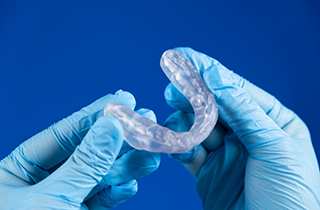TMJ Treatment Boston
Uncovering the Mystery of TMJ Disorder

You may spend most of your life unaware of the important little triangular-shaped joints located in front of your ears. Under normal conditions, they join your lower jaw and temporal bone, allowing your mouth to open and close easily.
However, stress or an improper bite can cause the joints to not function properly, exposing nerve endings to create pain. The resulting TMJ disorder, or TMD, can create a variety of mild to severe symptoms, from jaw clicking and minor discomfort to sharp pain in your temples, ears, neck, and shoulders.
Dealing with TMJ Disorder

The condition is very common, so we evaluate patients for TMJ dysfunction at their regular dental exams. If we detect a problem, our goals are to arrest it, protect teeth from further damage, and correct underlying bite misalignment.
Therapy may involve fitting you with a physiologic bite appliance, suggesting ways to alleviate stress, and recommending symptom relief measures. Typically, TMJ patients need to avoid chewing gum or hard/chewy foods, take small bites, and alternate chewing between both sides of the mouth.






